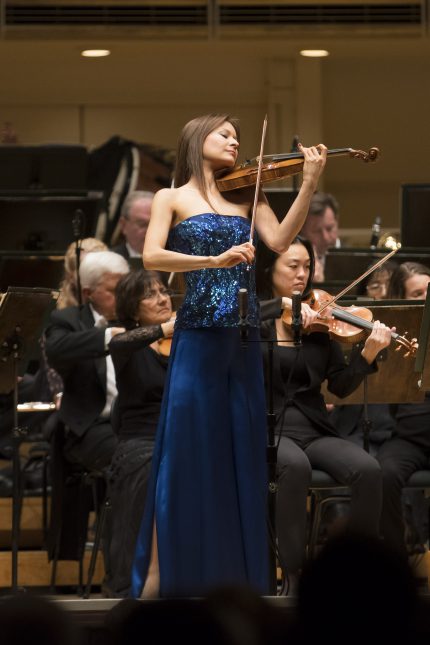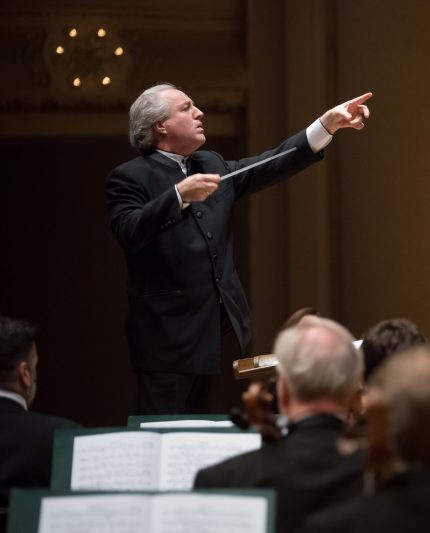Otherworldly Berg, exhilarating Schubert from Honeck and Steinbacher with CSO

It was unfortunate but not entirely unexpected that Christoph von Dohnanyi wound up cancelling this week’s scheduled concerts with the Chicago Symphony Orchestra. The German conductor, 88, has been beset by health issues in recent years and had to bow out of last season’s appearance as well.
The good news is that Manfred Honeck was available to take the reins once again. The Austrian conductor, music director of the Pittsburgh Symphony Orchestra, has become a popular figure in Chicago in recent seasons with audiences and, increasingly it seems, musicians alike. Dohnnayi’s program was unchanged, a smart Viennese serving of Webern, Berg and Schubert that serendipitously played to Honeck’s strengths as well. Too bad there were scores of empty seats Thursday for such a fine night of music-making.
Alban Berg’s Violin Concerto is one of the handful of 20th century works in the genre to secure a place in the standard repertoire. Yet Berg’s 1935 concerto is far from the standard virtuosic crowd-pleaser. Crafted with a 12-tone row, the music is largely subdued and elliptical. Berg’s modified serialism seems to hover between tonal and atonal, and just when it seems about to break out into a romantic outpouring, the row invariably pulls it back.
In her first CSO appearance in a decade, violinist Arabella Steinbacher proved an ideal advocate for Berg’s elusive concerto. Playing with a slender, silvery timbre, the German soloist’s style was intimate in scale yet duly ardent and dedicated, in music that seems to continually shift between restlessness and repose.
Steinbacher was most convincing in the elegiac, dreamlike pages. Berg dedicated the concerto “to the memory of an angel” and in the closing Adagio especially, the violinist played with a spare, otherworldly tone; floating above the orchestra’s inexorable Cantus firmus, Steinbacher seemed to embody the gentle innocent spirit of the dedicatee Manon Gropius, dead of polio at age 19. (Berg himself would die the same year with the Violin Concerto as his last completed work.)
Honeck and the orchestra were full partners in Steinbacher’s performance, the conductor providing an equally concentrated foundation with a sure handle on the shifting, mercurial pulse, while drawing iridescent textures from the ensemble.
Berg’s concerto was preceded by another bit of Bach channeling by Anton Webern, the third pillar of the Second Viennese School. Webern’s orchestral arrangement of the Ricercar No. 2 from Bach’s The Musical Offering is faithful to the fugal original, passing the musical line from instrument to instrument even within phrases. The result blends Bach’s Baroque sensibility with a slightly astringent 20th century overlay that seems to skirt the edge of tonality, like a stone skipping across the surface of a pond. Honeck led a fluent understated performance that in just nine minutes seemed to seamlessly straddle both centuries, building inexorably to a weighty coda.
Schubert’s Symphony No. 9 in C major, the “Great,” closed the evening and more than lived up to its title under Honeck’s energized direction. As with his previous CSO stands, the conductor showed a singular ability to revitalize a familiar Austro-German work with fresh vigor and a bracing sense of urgency.
From the elegant introduction by the two horns and a boldly projected main theme, Schubert’s 50-minute canvas of buoyant melody unfolded with bold textures and strong rhythmic accents–Honeck at times lunging at the orchestra in his animated style and getting an equally emphatic response.
Tempos tended to be on the fleet side–the emphasis in the Andante was clearly on the con moto—and at times the lyric charm seemed to get short shrift. But such was the engaging vitality of the music-making that it was hard to resist. The full stop at the height of the joyful second movement made apt jarring impact–as if Schubert suddenly realized, “I’m very sick and dying–what the hell am I so happy about?”
The finale was off at a crackling pace, Honeck ratcheting up the tension to an exhilarating and blazing coda. With superb playing across all sections and clear enjoyment by the CSO musicians throughout the performance, Manfred Honeck’s local stock increases with each appearance.
The program will be repeated 7:30 p.m. Friday at Wheaton College, and 8 p.m. Saturday at Symphony Center. cso.org; 312-294-3000.
Posted in Performances



Posted Nov 10, 2017 at 1:06 pm by Paul Cohan
Mr. Honeck is the real deal. He will be back at the end of January to conduct Mahler #5. It would be nice to hear him conduct a major choral work with the CSO/Chorus. Honeck’s contract in Pittsburgh expires at the end of 2020, the same year Riccardo Muti’s expires here in Chicago.
Posted Nov 12, 2017 at 6:48 am by Tod Verklärung
As Mr. Johnson’s review suggests, Honeck is a great and growing artist, and the Saturday night concert revealed why. Precise string articulation, rhythmic life, and an ability to make the old new. To the good, he played with tempo a bit, as in the very slow rendering of the cello tune after the second movement’s “full stop.” The conductor and musicians clearly worked to achieve the quietest playing (even from the trombones) I’ve heard in Orchestra Hall in a long time. Honeck’s imaginative exaggeration of some of the timpani strokes in the finale’s coda was striking, too. Steinbacher, for her part, was angelic and moving.
As Mr. Cohan’s comment states, the coincidence of Mr. Muti’s contract’s ending (unless it is renewed) lines up with Honeck’s availability – for now. But be aware, Michael Tilson Thomas will be leaving San Francisco and Mr. Honeck is already being mentioned as a possible replacement in 2020. Might Mr. Johnson ask Muti or the CSO executives what the future might hold with respect to endings and beginnings?
Posted Nov 12, 2017 at 7:05 am by Bob Eisenberg
Too bad the review, and that in the Chicago Tribune, spent so much time on the cubist Bach, a de-sconstruction of his music as inappropriate as a cubist version of the Mona Lisa. And the less said about a composer who uses the twelve tone system, the better as far as I am concerned (after 50 years of trying to be fair to that desecration of the Viennese tradition of classical music).
The shame is that no space was devoted to writing about the miraculous playing of the orchestra, including woodwind choir work very much better than in most of the last decades, approaching the best that Philadelphia and Cleveland woodwinds did at their peak (and we do not yet have a Principal Oboe, but why bother with the personnel we do have already)
And then there were the strings playing with absolute precision of intonation and timing not matched by anyone else ever that I have heard.
And finally the trombones, Chicago’s secret bass, that makes the orchestra so distinctive, led by our wonderful seventy-eight year old Jay Friedman leading a section that plays as well as anyone has ever imagined trombones could play, everyday every night for every year since 1964.
That is what we should read about, not music so awful that many subscribers did not show up and hear it.
Posted Nov 12, 2017 at 7:13 am by Mark
I have not heard whether Muti will renew his contract, but I would be surprised if Honeck was a top replacement choice. His programming in Pittsburgh has been okay, but not very innovative and he tends to repeat works a lot. In that respect, he would be similar to Muti. Despite my personal reservations about Muti, however, there is no doubt that he is in the very top-tier of conductors in the world, and that is what the CSO typically goes for. Honeck is not there, and the fact that he was passed over by the New York Philharmonic would hurt his chances in Chicago.
That said, I found his performance of the Schubert 9th Symphony an improvement over what I heard by the last two CSO music directors (Muti and Barenboim), but as I now listen to the Bernstein/Concertgebouw recording, my doubts from Saturday night’s performance are confirmed.
Posted Nov 12, 2017 at 8:53 pm by Andrew
With no apologies to cranky Bob above, I love Berg’s Violin Concerto, and I’m very sorry I missed these performances of it.
Posted Nov 13, 2017 at 7:03 am by Mark
Andrew, it’s too bad you missed the Berg concerto, because it was the finest performance of it that I can remember. Obviously, credit is due to the soloist, but both the soloist and conductor (and orchestra) are needed to make the piece work. Here Hoeneck really displayed impressive musicianship.
I agree with Bob generally that Honeck elicited wonderful playing from the CSO in the Schubert, and the trombones were a standout having impact without overwhelming the rest of the orchestra. Honeck’s brisk tempos throughout, however, negated much of the poetry in the work. Still, he had a pretty convincing conception of the piece, and was able to execute it on his own terms.